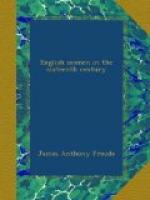Parma was content that she should amuse herself with words and neglect her defences by sea and land. By the end of February Santa Cruz was ready. A northerly wind blows strong down the coast of Portugal in the spring months, and he meant to be off before it set in, before the end of March at latest. Unfortunately for Spain, Santa Cruz fell ill at the last moment—ill, it was said, with anxiety. Santa Cruz knew well enough what Philip would not know—that the expedition would be no holiday parade. He had reason enough to be anxious if Philip was to accompany him and tie his hands and embarrass him. Anyway, Santa Cruz died after a few days’ illness. The sailing had to be suspended till a new commander could be decided on, and in the choice which Philip made he gave a curious proof of what he intended the expedition to do. He did not really expect or wish for any serious fighting. He wanted to be sovereign of England again, with the assent of the English Catholics. He did not mean, if he could help it, to irritate the national pride by force and conquest. While Santa Cruz lived, Spanish public opinion would not allow him to be passed over. Santa Cruz must command, and Philip had resolved to go with him, to prevent too violent proceedings. Santa Cruz dead, he could find someone who would do what he was told, and his own presence would no longer be necessary.
The Duke of Medina Sidonia, named El Bueno, or the Good, was a grandee of highest rank. He was enormously rich, fond of hunting and shooting, a tolerable rider, for the rest a harmless creature getting on to forty, conscious of his defects, but not aware that so great a prince had any need to mend them; without vanity, without ambition, and most happy when lounging in his orange gardens at San Lucan. Of active service he had seen none. He was Captain-General of Andalusia, and had run away from Cadiz when Drake came into the harbour; but that was all. To his astonishment and to his dismay he learnt that it was on him that the choice had fallen to be the Lord High Admiral of Spain and commander of the so much talked of expedition to England. He protested his unfitness. He said that he was no seaman; that he knew nothing of fighting by sea or land; that if he ventured out in a boat he was always sick; that he had never seen the English Channel; and that, as to politics, he neither knew anything nor cared anything about them. In short, he had not one qualification which such a post required.




